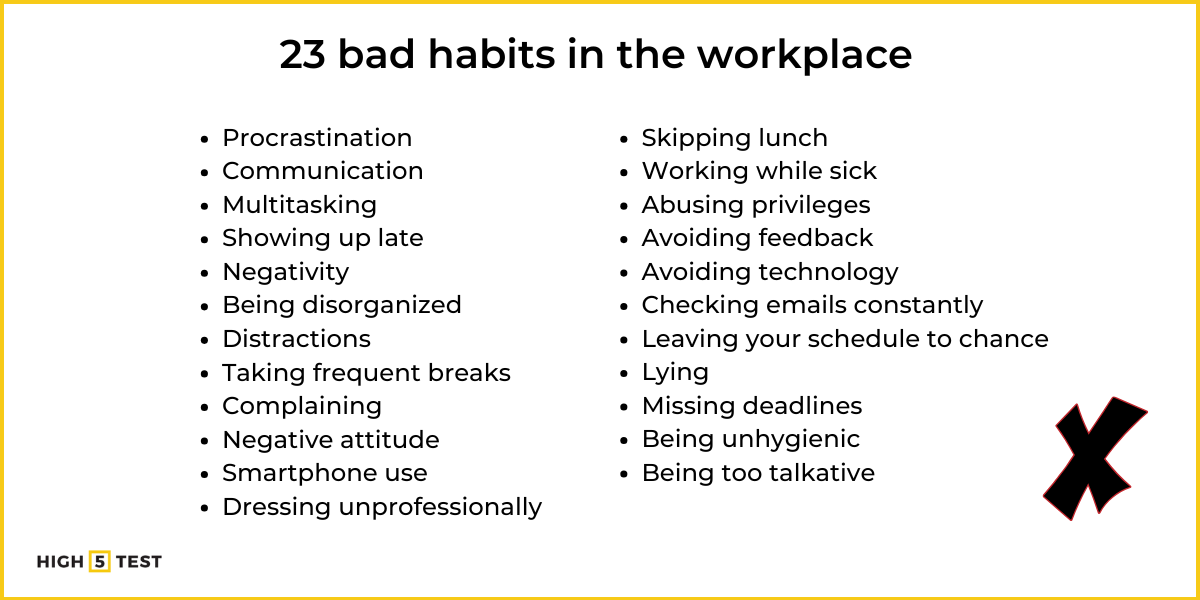Working on changing your bad work habits is always a good idea. Focus on building and sustaining good habits to achieve personal and professional success. While respecting your job, workplace, and coworkers is crucial for professional growth, you have to eliminate poor behaviors before nurturing healthy ones. One effective way to kickstart this journey is by taking the HIGH5 strengths assessment, which helps individuals identify their unique strengths and leverage them to overcome negative habits.
By understanding your natural talents and how to apply them, you can lead a more productive and fulfilling work life. It’s time to buckle down and make some good adjustments if you’ve slipped into any of the following bad work habits. In this article, we define bad workplace habits and present a list of negative habits you may have at work, along with specific suggestions for how to fix them.
What is a bad work habit?
A bad work habit is a recurring negative behavior or pattern that disrupts productivity, diminishes job performance, and can harm professional relationships. These habits often develop over time and can stem from poor time management, lack of organization, or ineffective communication skills. Identifying and addressing bad work habits is crucial for achieving long-term career success.
Pro Tip From HIGH5
Reflect on the situations or tasks that trigger your bad habits, and consider how you could apply your top strengths, identified by HIGH5, more constructively in those scenarios. For instance, if procrastination is an issue, your strength of focus could be better utilized by creating a schedule and breaking larger tasks into smaller, actionable steps.
23 examples of bad habits in the workplace
In a world filled with productivity tools, there are habits that amplify their impact. Once you’ve discovered your bad habits, you can correct them before they have long-term consequences for your professional relationships and performance. Here are 24 examples of common negative working habits:

- Procrastination
- Communication
- Multitasking
- Showing up late
- Negativity
- Being disorganized
- Distractions
- Taking frequent breaks
- Complaining
- Negative attitude
- Smartphone use
- Dressing unprofessionally
- Skipping lunch
- Working while sick
- Abusing privileges
- Avoiding feedback
- Avoiding technology
- Checking emails constantly
- Leaving your schedule to chance
- Lying
- Missing deadlines
- Being unhygienic
- Being too talkative
Procrastination
Procrastination involves delaying tasks or decisions until the last possible moment, often leading to rushed work and poor outcomes. It can create unnecessary stress and hinder productivity, making it harder to meet deadlines.
Communication
Poor communication in the workplace, whether it’s not responding to emails or failing to convey important information, can lead to misunderstandings, missed opportunities, and weakened team dynamics. Effective communication is crucial for maintaining collaboration and ensuring tasks are completed efficiently. It’s hit number one on the in-demand skills chart, according to LinkedIn [1]. Why? Every job requires communication to some degree.
Multitasking
Multitasking, or trying to handle several tasks at once, often results in reduced productivity and increased errors. Rather than achieving more, multitasking can dilute focus and lead to burnout.
Showing up late
Regularly showing up late to work or meetings demonstrates a lack of respect for others’ time and can disrupt the workflow. Consistent tardiness may damage your professional reputation and strain relationships with colleagues and supervisors.
Negativity
Negativity in the workplace can spread quickly, creating a toxic environment that lowers morale and productivity. Maintaining a positive outlook is essential for fostering a collaborative and supportive work culture.
Disorganization
Disorganization, such as cluttered workspaces or chaotic schedules, can lead to lost time and missed deadlines. Maintaining order and structure in your work environment helps improve efficiency and reduce stress.
Distractions
Frequent distractions, whether from a noisy environment or constant phone notifications, can significantly hinder focus and productivity. Minimizing distractions is key to staying on task and completing work efficiently.
Taking frequent breaks
While breaks are necessary for maintaining energy, taking too many can disrupt workflow and lead to lost productivity. It’s important to balance break times to ensure continuous progress on tasks.
Complaining
Constantly complaining about work or colleagues can create a negative atmosphere and strain professional relationships. Constructive feedback is more effective than dwelling on problems without offering solutions.
Negative attitude
A negative attitude can undermine your efforts and those of your colleagues, leading to a lack of motivation and collaboration. Cultivating a positive mindset helps in overcoming challenges and contributes to a healthier work environment.
Smartphone use
Excessive use of smartphones during work hours can be a major distraction, pulling attention away from tasks and reducing productivity. Setting boundaries on phone usage helps maintain focus and work efficiency.
Dressing unprofessionally
Dressing unprofessionally can give off the impression that you don’t take your job seriously and may affect how others perceive your competence. Adhering to a professional dress code helps you project confidence and credibility.
Skipping lunch
Skipping lunch may seem like a way to get more work done, but it can lead to decreased energy levels and reduced productivity later in the day. Regular meals are important for maintaining focus and performance.
Working while sick
Working while sick can prolong recovery and potentially spread illness to coworkers. It’s important to take the necessary time to rest and recover, ensuring you’re fully productive when you return.
Abusing privileges
Taking advantage of workplace privileges, such as flexible hours or company resources, can lead to trust issues and resentment among colleagues. It’s essential to use these benefits responsibly to maintain a positive work environment.
Avoiding feedback
Avoiding feedback, whether due to fear of criticism or disinterest in improvement, can stunt your professional growth. Embracing feedback is crucial for learning, developing skills, and advancing in your career.
Avoiding technology
In today’s workplace, avoiding technology can limit your efficiency and ability to collaborate effectively. Embracing and learning new tools and software is essential to staying relevant and productive in your role.
Checking emails constantly
Constantly checking emails can interrupt your workflow and reduce productivity. Setting specific times to review and respond to emails can help you stay focused on more critical tasks.
Leaving schedules to chance
Failing to plan your workday can result in missed deadlines and unprioritized tasks. Structuring your schedule with clear goals helps ensure that you manage your time effectively and accomplish what’s most important.
Lying
Lying in the workplace, whether to cover mistakes or exaggerate achievements, can damage your reputation and lead to a loss of trust from colleagues and supervisors. Honesty is crucial for building trust and maintaining strong professional relationships.
Missing deadlines
Missing deadlines consistently reflects poorly on your reliability, and can disrupt team projects. Prioritizing tasks and managing time effectively is essential for meeting deadlines and maintaining your professional reputation.
Being unhygienic
Poor personal hygiene can create discomfort in the workplace and affect how others perceive you. Maintaining good hygiene is important for professionalism and fostering a respectful work environment.
Chatting too much
Excessive talking during work hours can be distracting for both you and your colleagues, leading to decreased productivity. It’s important to balance social interactions with focused work time to stay on track with your tasks.
Solutions on how to break bad work habits
1. Procrastination
According to Forbes, procrastination is one of those bad work habits that can cost your job. Indeed, it’s all too easy to get caught up in the trap of putting off accomplishing projects. People are more prone to putting off starting a long-term objective until the last available time. Because you have to speed through it, this can have an impact on the final outcome. There may be internal and external causes preventing you from starting this endeavor, such as unexpected events that cause delays. Break up your assignment into smaller portions to avoid procrastination. You can handle the project in stages to avoid becoming overwhelmed.
2. Overworking with no break
It may appear that you must labor nonstop in order to get the most out of your employment at times. The fallacy is that skipping breaks allows you to work more productively. In fact, taking regular breaks at work is accompanied by plenty of benefits, both for your health and for better work performance. A 2015 study proves that managers couldn’t identify the difference between those who worked 80-hour weeks and those who didn’t [2]. Watch out for your health, because not taking breaks can be taxing on both your mind and body. Taking a few pauses throughout the day, when you have plenty of time, is a simple cure for overworking.
3. Taking too many breaks
On the contrary, taking too many pauses can prevent you from being productive. In most cases, a bad distraction habit is what causes it. Snacking every hour, checking your phone, or simply not working for an extended period of time might cause you to lose focus and push back deadlines. One strategy to avoid taking too many breaks is to simply limit the number of breaks you take. Select breaks that are really important. This may appear difficult, but give yourself incentives to work longer. However, make sure you’re taking occasional breaks, like lunch breaks because it’s necessary to get out of work mode from time to time.
4. No plans or goals for the week
You can only get so far by making things up as you go. You can lose valuable working time if you don’t know which projects to work on or which components to complete first. Without a game plan, you are more likely to become overwhelmed with your tasks towards the end of the week. To avoid wasting time, create a weekly planner with blocks of time that clearly state what your tasks. It can take the form of a physical planner or an internet program, such as Notion. It will make day-to-day tasks easier to handle if you can see what you should do.
5. Being disorganized
Disorganization, whether it’s a cluttered desk, overloaded email inboxes, or late responsibilities, is a poor habit that may seriously disrupt your workday. Workplace tidiness should be part of our daily habits. In order to avoid being disorganized at work, you can use your desk drawer. Organize your desk so you know where all of your supplies are. Clear space, clear mind. When it comes to emails, try not to let them pile up and go unopened. Organization in the workplace can have a positive impact on your behavior, allowing you to work harder and more efficiently.
6. Bad communication
When you work remotely, you are not in an office with your team. It’s all too easy to fall into the trap of not reaching out to them since they’re not right next to you. You may forget to respond to phone calls or direct messages on collaboration apps, leave emails unread, and even miss video conferencing meetings. However, if you want to perform better, you should work on your communication habits. Poor communication can cause big problems in the workplace down the line.
As a remote worker, try to be more proactive in your communication. When working with a remote team, communication is critical for keeping your team informed and engaged. Set aside a certain period during your workday to check in with your team on all applications. Check your email and answer the most important ones. For faster chats, send a direct message.
7. Being too comfortable with work
Stability is a luxury in light of everything that has transpired around the globe. It may seem pleasant to fall into a routine of what is expected of you at work, but there are consequences to not wanting to change. From time to time, you may become too comfortable with your work, which suggests that you are unwilling to challenge yourself and progress as an employee. So, put yourself out there to stand out. Take the initiative. If your supervisor or coworkers require assistance with a project, speak with them. You can learn a lot by dabbling in projects that aren’t directly related to you and may help you progress in your profession.
8. Having a poor attitude
Consider the advantages of remaining professional in the workplace, no matter how irritating the situation may be. These advantages include to name a few, a better working relationship with your teammates, higher motivation and productivity, and increased job satisfaction. A negative attitude is frequently the result of stress or dissatisfaction with your current job, but no matter what the cause, it’s usually something you can control and change. So, try to identify the source of your bad attitude so you can address it and then attempt to eliminate the cause.
9. Lying
Lying in the workplace is never a good idea. This poor behavior can make a manager or coworkers distrust you, and if your falsehoods violate business standards, your manager may decide to fire you. It’s critical to act with integrity so that everyone you deal with knows they can count on you, which leads to positive and fulfilling professional relationships. To break the lying habit, think before you act or speak, try to reflect on your thoughts and behaviors, and make sure that what you do and say doesn’t harm anyone.
10. Disconnected from the team
When working remotely, it’s easy to feel disconnected from your team. Everyone is dispersed, doing their own thing on their own timetable. A lack of communication with your coworkers can have a negative impact on productivity in the long run. When working on a collaborative project, it’s critical to be a team player. Participate in group video calls to keep the team up-to-date on your progress. Reach out to your boss and team to foster a sense of teamwork and connection.
11. Negativity
If you have a negative attitude, you may waste time worrying about problems that aren’t actually problems. Furthermore, you risk causing yourself undue stress and early burnout. Everybody has a bad day. Nobody is flawless, so it’s impossible to always give your 100% at work. However, there is a distinction to be made between having terrible days and carrying a poor attitude into the workplace on a regular basis. It impacts your attitude toward the projects you work on. Identifying the cause of the problem is a good way to combat negativity. If it is work-related, speak with your supervisor or coworkers to see if any modifications can be made.
12. Not adapting to technology
Companies are using technology such as video conferencing apps, group chats, and emails to stay connected while working remotely. Become more comfortable with the applications that help businesses stay connected.
13. Lack of a proper workspace
More and more people are working from home, and the number of people who prefer working in offices is rapidly declining in 2024, 74% of workers feel happier when working from home, and about 15% of jobs in the States are now fully remote [3]. Some people have the luxury of having an at-home office, but the majority of people have to adapt to whatever they have, whether it’s a corner of a living room or a bedroom.
14. Abusing privileges
If your firm provides you with some leniency, such as allowing you to work from home on Fridays, you may discover that you’ve exploited these benefits. It may be more difficult to reposition yourself if a manager needs to address concerns about your performance.
15. Multitasking
Multitasking is a bad habit born of good intentions. When working as a team, you want to be able to complete the most work in the shortest amount of time. Juggling numerous projects at once might reduce your productivity. Instead, try to devote yourself to a single project for a period of time that works with your productivity levels.
Pro Tip From HIGH5
If you tend to struggle with taking breaks due to the Deliverer or Time Keeper strength, identified by HIGH5, try setting reminders on your calendar or using productivity apps that enforce break times. During your breaks, engage in activities that allow you to recharge in alignment with your other strengths, such as reading or going for a walk.
Why is it important to break bad work habits?
Good work habits, when consistently practiced, generate performance and contribute to job satisfaction and richer relationships. However, breaking negative patterns can be challenging without a clear understanding of your inherent strengths and how to leverage them effectively. The HIGH5 strengths assessment provides this self-awareness, enabling you to channel your natural talents towards positive habits that support your goals.
By aligning your daily actions with your unique strengths, you can experience the numerous benefits of overcoming bad habits, such as increased productivity, reduced stress, and a greater sense of fulfillment. Here are, science-supported benefits after you break bad work habits:
- Keep distractions to a minimum.
- Achieve the level of “deep work” that will help you become more engaged in your work.
- Make use of time productively.
- Encourage goodwill in coworkers and bosses.
- Clear your mind to be able to focus on your current tasks instead of trying to multitask throughout the workday.
- You will feel more comfortable at work. The chances of achieving job success and getting promoted will increase.
Pro Tip From HIGH5
After taking the HIGH5 strengths assessment, identify your top strengths and brainstorm specific ways to apply them in your daily work routine. For example, if one of your strengths is empathy, you could make a conscious effort to show more emotional intelligence and understanding when communicating with colleagues, fostering stronger relationships.
Break bad work habits with worksheet
Have a worksheet handy to regulate, identify, and alter your existing behaviors. Generally, having a worksheet is a great way to get a better understanding of your strengths and advantages, not only at work but in all areas of life. If you want to break down bad work habits and turn them into good ones, we recommend using this habit formation worksheet. The worksheet consists of three steps. It will help you identify your current habits at first. Then, you’ll break your negative habits and build positive new habits.
Bad work habits FAQ
What are 5 bad habits that you want to leave in your professional career to become successful?
The following 5 bad habits are considered the most harmful to work performance. The chances of achieving success will naturally increase by focusing on these bad habits and trying to turn them into positive ones.
- Poor communication
- Disorganization
- Negative attitude toward the workplace
- Taking too many breaks
- Procrastination
What are some bad work habits?
In order to break your bad work habits, identify your current habits. Use paper clips, specific worksheets, or remainder applications in order to take control of your daily goals. Focus on the habits you want to acquire and support your success. Even though correcting bad work habits can be challenging, the long-term rewards and successes are worth the effort.
How do you break bad work habits?
In order to break your bad work habits, first, you need to identify your current habits. Use paper clips, specific worksheets, or remainder applications in order to take control of your daily goals. Focus on the habits you want to acquire and support your success. Even though correcting bad work habits is difficult, constant effort and purposefulness will produce positive effects.
What is the most unhealthy habit?
The most unhealthy habit is procrastination, which can stem from a fear of failure or perfectionism [4]. It can lead to chronic stress, missed deadlines, burnout, and poor work quality. In the long term, this can significantly affect both your personal and professional life.
References:
- Wells, R. (2024, February 8). Communication Hits No.1 Spot As In-Demand Skill In 2024, Says LinkedIn. Forbes. https://www.forbes.com/sites/rachelwells/2024/02/08/communication-hits-no1-spot-as-in-demand-skill-in-2024-says-linkedin.
- Reid, E. (2015, April 28). Why Some Men Pretend to Work 80-Hour Weeks. Harvard Business Review. https://hbr.org/2015/04/why-some-men-pretend-to-work-80-hour-weeks.
- Yogiaman, R. (2023, January 5). 11 Surprising Statistics on Remote Work in 2022. Discover.strongdm.com. https://www.strongdm.com/blog/remote-work-statistics.
- Ph.D, B. R. (n.d.). Why You Procrastinate At Work And 7 Ways To Break The Cycle. Forbes. https://www.forbes.com/sites/bryanrobinson/2022/09/05/why-you-procrastinate-at-work-and-7-ways-to-break-the-cycle.








